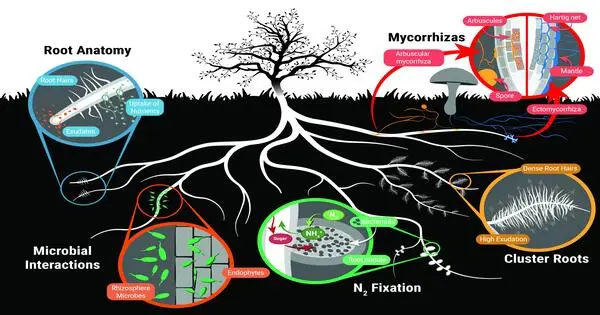Soil biology is important in determining several soil characteristics. It is the study of microbiological and faunal activities as well as soil ecology. Soil life, also known as soil biota, soil fauna, or edaphon, refers to all creatures that spend a significant portion of their life cycle within a soil profile or at the soil-litter interface. Soil organisms decompose organic matter, which has a huge impact on soil fertility, plant growth, soil structure, and carbon storage.
Earthworms, nematodes, protozoa, fungus, bacteria, various arthropods, some reptiles (such as snakes), and burrowing mammals such as gophers, moles, and prairie dogs are among these organisms. Much is unclear about soil biology and its impact on soil ecosystems as a relatively recent science. The soil is a complex ecosystem that supports a diverse range of microbes, plants, and animals, all of which play important roles in nutrient cycling, organic matter breakdown, and soil health.
Key components of soil biology include:
- Microorganisms: Bacteria, fungus, archaea, protozoa, and algae are all important soil microorganisms. They help with nutrient cycling, organic matter breakdown, and disease prevention.
- Plants: Plant roots interact with soil organisms, for example, creating symbiotic partnerships with mycorrhizal fungi, which aid in nutrient intake. Plants also add organic matter to the soil via root exudates and litter.
- Macroorganisms: Macroscopic species such as earthworms, nematodes, arthropods, and tiny mammals live in soil. These organisms perform critical roles in the development of soil structure, nitrogen cycling, and organic matter decomposition.
- Organic Matter: The organic matter in soil consists of plant and animal residues at different stages of decomposition. It serves as a source of energy and nutrients for soil organisms and plays a crucial role in soil structure, water retention, and nutrient availability.
- Nutrient Cycling: Soil organisms are involved in the cycling of essential nutrients such as nitrogen, phosphorus, and sulfur. Microorganisms decompose organic matter, releasing nutrients that can be taken up by plants.
The general health of the soil is determined by the diversity and balance of its biological components. A healthy soil ecosystem is more resistant to diseases, pests, and environmental stressors.
Understanding soil biology is critical for sustainable agriculture because it explains how different soil organisms affect plant growth, soil fertility, and ecosystem stability. Soil biologists examine the composition and function of the soil microbial population using a variety of approaches such as molecular biology, microbiology, and ecology. This understanding contributes to the development of agricultural techniques that increase soil health and productivity while minimizing environmental impact.















